“Teaching for a Better World”: Advancing the Field of English Education
An Interview with Lindsay Herron
If you are a language teacher in the Gwangju area or a member of Korea TESOL (KOTESOL), the nationwide teachers’ association, you have quite likely heard of Lindsay Herron. She has spent well over a decade teaching in Korea and almost as long involved in KOTESOL. Lindsay is presently the president of the Gwangju-Jeonnam Chapter of KOTESOL, a past national president of KOTESOL, and the chair of this spring’s KOTESOL International Conference. Lindsay graciously agreed to the following interview to talk about teaching, the local KOTESOL chapter, the upcoming conference, and a bit about herself. — Ed.
KOTESOL: Hi, Lindsay. Thank you for this interview that you are doing for the Gwangju News. To start things off, would you give us a bit of background information – things like what you did before coming to Korea, what brought you here, and what has kept you here?
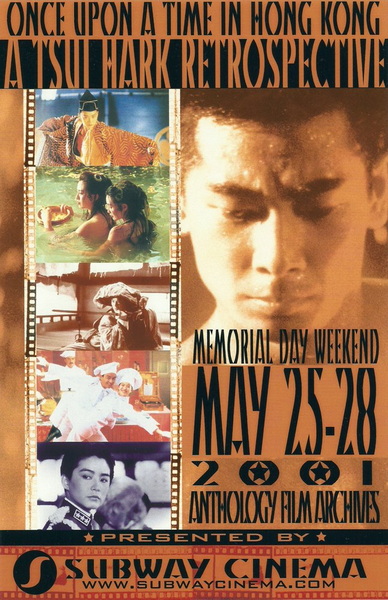
Lindsay: Before I came to Korea, I worked in publishing in New York City, which was amazing. My entire life-path changed one Memorial Day weekend, though, when a friend invited me to join her for a Tsui Hark retrospective at the Anthology Film Archives. I didn’t actually know what a “Tsui Hark” was, but I went with her anyway. I quickly discovered he was a superb Hong Kong film director, and the six films we watched that weekend were absolutely mesmerizing! They reignited my love of film, and I started learning as much as I could about Asian cinema, including attending screenings of Korean films throughout the city. I started taking Korean language lessons after work, just for fun; and by 2003, I’d decided to quit my publishing job to pursue a master’s in cinema studies at New York University’s Tisch School of the Arts.
At the time, there were many books available in English about most national cinemas in Asia, but I could only find three on Korean cinema, an appalling gap I resolved to fill. I decided to move to Korea for a year or two, master the language and culture, return to the U.S. to pursue a doctorate in film studies, and eventually become one of the foremost North American experts on Korean cinema. Pretty solid plan, right? What actually happened, though, was I got accepted to the Fulbright Korea ETA program; got assigned to a boys’ high school in Seogwipo, Jeju-do; and immediately fell deeply, irrevocably in love with teaching and my students the moment I walked into the classroom. I’ve been in Korea ever since, dedicating myself to teaching (and learning about teaching) with the same enthusiasm I used to devote to cinema studies. Ironically, I haven’t seen many Korean movies since I moved here, though I did get to meet one of my favorite actors, Yu Oh-seong, in person, and I sat directly behind another one, Ahn Sung-ki, at a film festival awards ceremony during my first year here!
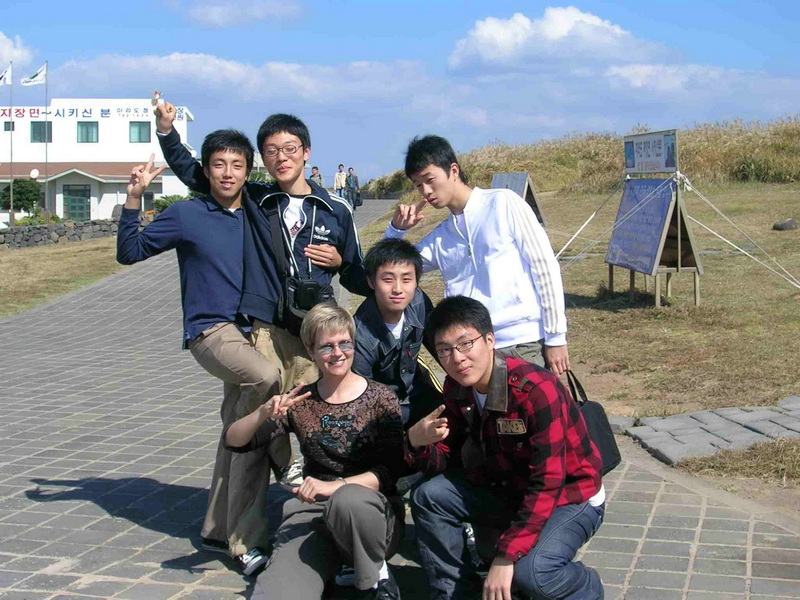
KOTESOL: You are quite active in KOTESOL (Korea TESOL) and have been for some time; indeed, you are currently the president of the Gwangju-Jeonnam Chapter. How did you get involved in KOTESOL, and what has kept you so involved?
Lindsay: When I first came to Korea, I was eager for professional development (PD) and a professional learning community, since I felt desperately under-prepared; but at the time, there weren’t many options for PD in Jeju-do. When I moved to Gwangju, I immediately searched the KOTESOL website for local, regional, and national events – and then I just started attending, often with a friend who was as excited about PD as I was. I didn’t start volunteering, though, until after the 2012 KOTESOL National Conference in Busan. As the conference ended, I decided on a whim to join the post-conference social dinner, where I got to meet the conference chair, Brad Serl, and a variety of National Council officers. I remember being both surprised and thrilled to discover they weren’t as intimidating and aloof as I’d imagined; indeed, they were absolutely delightful – very affable and welcoming, if a bit tired from the conference. Shortly after that, you, Dave, asked me to write a review of the conference for The English Connection, KOTESOL’s quarterly magazine, and I was pleased to accept; when my writing evidently passed muster and you invited me to join the 2012 KOTESOL International Conference team, I didn’t hesitate. In the hectic months leading up to the conference, I thoroughly enjoyed working with the conference committee members, including Brad Serl, who served as registration director that year. I’ve been handling conference registration – and volunteering in other leadership positions – ever since!
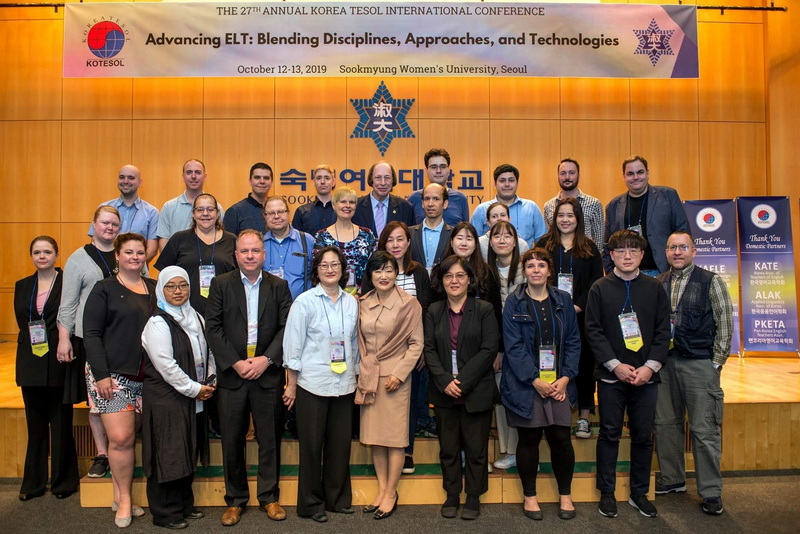
What keeps me involved, though? Well, first and foremost, I adore KOTESOL people. KOTESOL is my home away from home; KOTESOL members are my community of practice, my support group, and my family in Korea. I also love being able to contribute to the organization in personally meaningful and motivating ways, growing not just as a teacher but in other ways, as well. KOTESOL encourages volunteers to identify an area of need and then take steps to address it, offering support, guidance, and resources throughout the process. That’s really how I keep getting sucked ever further down the rabbit hole: noticing a gap that needs filling or an area that can be streamlined and then figuring out how to do it! That’s how I (re-)started the KOTESOL News email newsletter eight years ago, for example, and why KOTESOL Voices, our monthly online publication featuring the personal perspectives and insights of our many diverse members, exists. I can’t resist a good challenge – and I’ve developed a plethora of unexpected skills along the way!
KOTESOL: Well, I am glad to know that I was instrumental, in a small way, in your present multifaceted involvement in KOTESOL. Moving on to a topic arguably more infectious, the Covid curse has curtailed the activities of so many organizations, and businesses as well. What has the Gwangju Chapter been doing during the Covid chaos? Do you see normalcy returning soon to chapter activities?
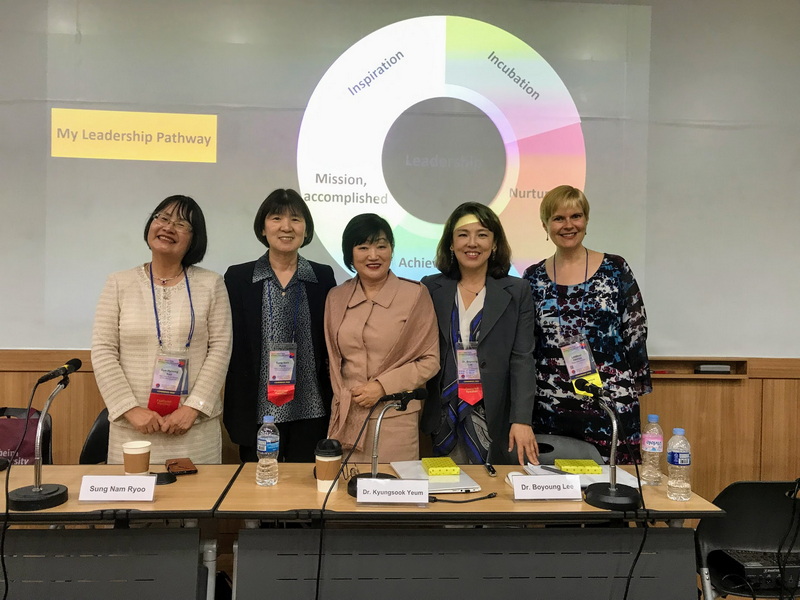
Lindsay: The Gwangju-Jeonnam Chapter of KOTESOL has continued to host regular events throughout the year, generally keeping to our usual schedule of meeting at 2 p.m. (KST) on the second Saturday of each month. We have, however, moved our events online instead of holding them in person – which has actually proven quite a wonderful opportunity for the chapter! Because our meetings are now on Zoom, we’ve been able to attract presenters from around Korea as well as around the globe, such as a recent workshop by a presenter based in China and our Q&A with a local Korean lawyer and her colleague overseas. We’ve also become more accessible to participants in other countries, including from our chapter’s new partner, the Okinawa Chapter of JALT [Japan Association for Language Teaching]. As Korea eases restrictions on public gatherings, we’ll start returning to face-to-face meetings, likely at our previous venue, Gwangju National University of Education. I anticipate retaining some online events, though, as they’ve truly allowed us to expand our horizons in new, promising, convenient ways!
KOTESOL: This year’s conference theme is intriguing: “More Than Words: Teaching for a Better World.” Unlike most KOTESOL conference themes, it does not mention foreign language learning or ELT. How did the theme come about, and what is the message that it espouses?
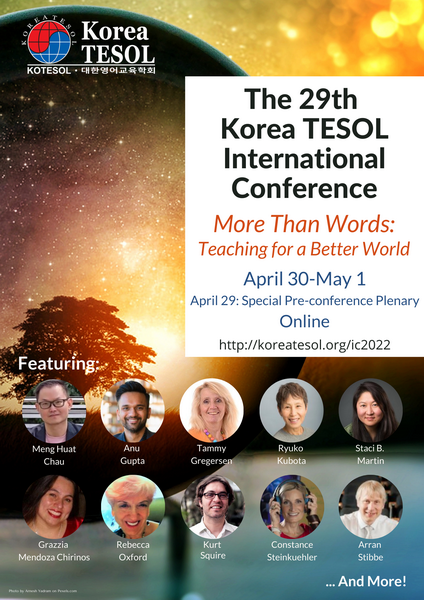
Lindsay: In my first inquiry class, one of the scholars we read pondered the question of what defines good research. He suggested that good research in some way promotes well-being, and that idea – the connection between the minutiae of research and the wider world – was revelatory to me. Since then, I’ve been inspired by work that explores engaged pedagogies and humanistic approaches; that challenges traditional deficit narratives of what learning “looks like”; that centers transformative teaching and critical perspectives; that supports inclusion, diversity, equity, and integrity; and that ultimately envisions a more positive, compassionate, responsive world for teachers and students alike. Making the world a better place – isn’t that what life (and especially teaching) is all about?
The theme is also partially in response to people who conceive of education in very discrete, limited, post-positivistic ways, who argue that we should “just teach English.” What does that even mean? All of our decisions in the classroom are influenced by our own perspectives, experiences, and beliefs about the world. How we organize and manage our classrooms, how we evaluate students, the behaviors we value, the activities we choose, even the vocabulary we prioritize – everything is shaped by our own positionality and impacted by how we conceptualize “learning.” The idea that we can “just teach English” thus strikes me as a bit myopic, failing to fully consider all the influences that intersect in the classroom to inform our presence, preferences, and priorities as teachers. This is one big element the “More Than Words” part of the theme seeks to capture and what our conference seeks to explore.
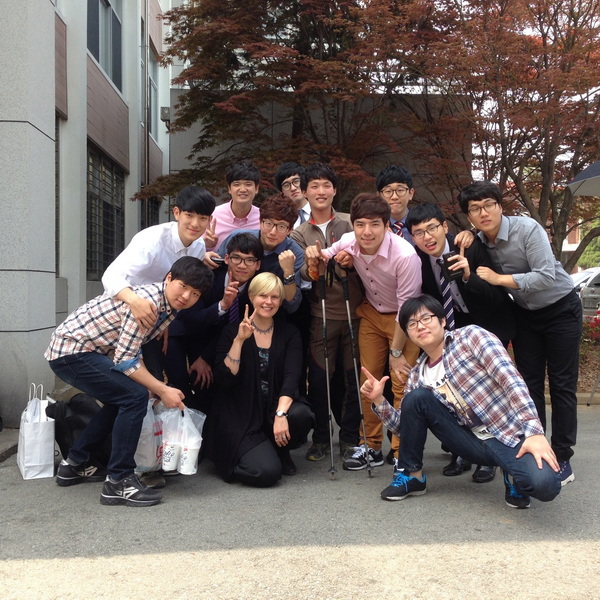
KOTESOL: KOTESOL’s conferences always feature a number of invited speakers who address the conference’s theme. What and who do conference-goers have to look forward to this year?
Lindsay: I’m absolutely ecstatic about this year’s slate of invited speakers! We’re reaching beyond the field of ELT-proper to explore the purposes and ideologies underpinning education as a whole; and we’ve sought, in particular, to include voices that are typically underrepresented.
First, we’re holding a special pre-conference plenary session featuring Anu Gupta, the founder of Be More with Anu and a former teacher in Korea himself, who has dedicated his life to educating organizations about breaking bias. You might have encountered him on The Oprah Conversation, on the TED Talk stage, or in the pages of Newsweek. Then throughout the weekend, participants can enjoy featured sessions by Kurt Squire and Constance Steinkuehler, scholars from the field of informatics and cognitive science, who will challenge traditional conceptualizations of “learning” by exploring how learning and literacy are related to games and e-sports; Rebecca Oxford, an expert on peace linguistics and peace education; Staci B. Martin, who studies critical hope and despair and peacebuilding in education; Ryuko Kubota, who will explore antiracism in ELT; Meng Huat Chau, who will focus on the ways educators can enact principles of ecojustice and inclusion; Arran Stibbe, a scholar in ecolinguistics; Grazzia Mendoza Chiniros, an educator from Honduras presenting on the power of engagement and connection; and Tammy Gregersen, who will refocus the conversation inward as she addresses teacher well-being. I’m also looking forward to invited sessions on social-emotional learning, by Luis Javier Pentón Herrera and Gilda Martínez-Alba; the power of connection, by Nikki Ashcraft; and Francis Daehoon Lee, the director of the Trans-Education for Peace Institute in Korea.
KOTESOL: What an array of luminaries and expertise! I cannot wait to hear their talks, but I am sure I would also enjoy hearing and meeting them in person. For the second language educators who enjoy attending face-to-face conferences but are not sure if they want to attend an online event, what are the plusses to participating in a virtual conference such as KOTESOL’s?
Lindsay: Oh, wow, where to start? Virtual conferences have many advantages over face-to-face conferences! First and foremost, it frees the conference from the boundaries of time and space. Participants can join from anywhere in the world, making virtual conferences more accessible to people with less time or money or from countries with weaker visas or lower vaccination rates. We’re offering asynchronous sessions and recording many of the synchronous sessions, as well, providing convenient “anytime, anywhere” access, thereby facilitating participation by people whose attendance would normally be restricted by time demands – for example, people in less-convenient time zones, parents, people who work on the weekends, and people whose active participation is limited by health or other concerns. By increasing access, we seek not only to promote equity and inclusion but also to increase the diversity of perspectives represented, making this a true agora of ideas. In addition, in-person conferences generate a lot of waste; though KOTESOL conferences in the past have tried to minimize waste, those efforts certainly can’t compare to a conference in which all the materials are digital and all the travel is virtual.
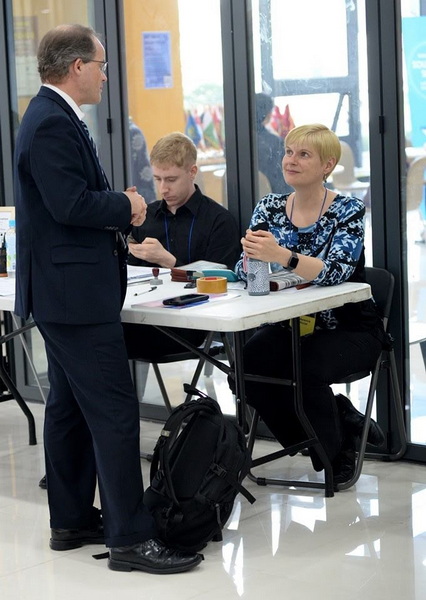
For me, personally, the convenience alone is worth the change. I love participating from home, saving the time, energy, and cost normally involved in traveling to an in-person conference. I can do laundry between sessions; attend in sweatpants; and save money on hotel rooms, transportation, and food. An online conference also offers convenience and savings in terms of organization: For example, we need far fewer volunteers and staff; the number of sessions isn’t limited by physical space; and we don’t have to rent any equipment. I think participants will really enjoy being able to partake of the sessions and socializing from the comfort of their own home – in pajamas, if they wish!
KOTESOL: For the person who has pretty much decided that they want to attend, what technology will the conference be using, what technology should the conference-goer prepare, had how do they register for the conference?
Lindsay: We’re primarily using an online event platform called Edzil.la which was developed by a colleague in our partner organization JALT. Participants will need to buy a ticket either on Edzil.la (payment by PayPal) or on the KOTESOL website (payment by bank transfer or Wise; available until April 15 only). Tickets are issued automatically for all payments via PayPal, but it’ll take a few days for payments by bank transfer or Wise to be received and tickets manually issued. Once you have a ticket, you’re basically ready to go!
We’re supplementing Edzil.la with a mélange of complementary technologies. For synchronous sessions, a Zoom link will appear on the event platform’s “Live” page about ten minutes prior to each session’s start time. Asynchronous sessions will be available on YouTube throughout the conference and for a month following the conference. Posters will be created and shared in Padlet, allowing poster presenters to present information in more creative, interactive, multimodal ways than in the past. Finally, we’re using Discord to facilitate conversations among participants and to share important announcements. These technologies are largely intuitive, so participants should be able to figure them out easily! Of course, we’ll also have staff actively manning Discord to answer questions and troubleshoot any problems that arise.
KOTESOL: Could you give us some idea of how many presentations there will be, what different types of formats they may take, and what the range of topics may be?
Lindsay: We’re still getting everything confirmed and set, but it looks as if we’re going to have about 150 sessions covering a wide variety of formats, durations, and topics. We’ve got everything from pecha kucha-style lightning presentations lasting just over six minutes each to 80-minute workshops and panels. We’ve got presentations on research as well as workshops offering practical take-aways teachers can immediately implement. Topics run the gamut from ELT-oriented areas such as teaching specific language skills to areas related to education and pedagogy more generally, such as creativity and critical thinking. The days will be jam-packed from 9 a.m. until 6 p.m. Korea time – and beyond, actually, as we’ve got quite a few asynchronous presentations that will be available via YouTube, and we’ll be recording many synchronous sessions, as well, for participants to view at their leisure in the month following the conference.
KOTESOL: I do not know where you find the time to do everything that you do – conference-related and otherwise. In addition to your day job at Gwangju National University of Education, you are also the membership chair at KOTESOL. And, oh yes, you are doing a doctorate with Indiana University. Could you tell us a little about your studies there?
Lindsay: I’m working on an EdD by distance through Indiana University Bloomington, and I’ve thoroughly enjoyed it! The program is in the Literacy, Culture, and Language Education (LCLE) Department, and my doctoral minor is in learning sciences, so I’ve had opportunities to take a wide range of classes outside the field of language education – as you can probably guess from the diversity of the conference’s invited speakers. I feel the LCLE program has given me a well-rounded, critical perspective on education and educational inquiry. The coursework was interesting and challenging, and it built well to the qualifying exam and dissertation – which I’m still working on, unfortunately, after getting a bit sidetracked for the past two years.
KOTESOL: What do you like to do in your spare time, when such free moments present themselves?
Lindsay: I don’t have much free time these days, but in rare quiet moments, you can find me reading on my veranda, trying a new recipe, catching up on various Netflix shows, or listening to a podcast while wandering around my neighborhood. In pre-Covid days, I also spent a lot of time traveling, going to the opera, watching movies, and scuba diving – my most recent hobby.
KOTESOL: Thank you for this comprehensive interview, Lindsay. Good luck with the April 30 – May 1 conference and with everything else you are involved in!
Interviewed by David Shaffer.
Photographs and graphics courtesy of Lindsay Herron, unless otherwise credited.
The 29th Korea TESOL International Conference
- More Than Words: Teaching for a Better World
- April 30 – May 1, 2022 (Virtual)
- https://koreatesol.org/IC2022
Useful Links
- Gwangju-Jeonnam KOTESOL: http://koreatesol.org/gwangju
- Facebook: Gwangju-Jeonnam KOTESOL
- The English Connection: https://koreatesol.org/node/330
- KOTESOL News: https://koreatesol.org/content/kotesol-news-email-newsletter
- KOTESOL Voices: https://koreatesol.org/content/kotesol-voices






